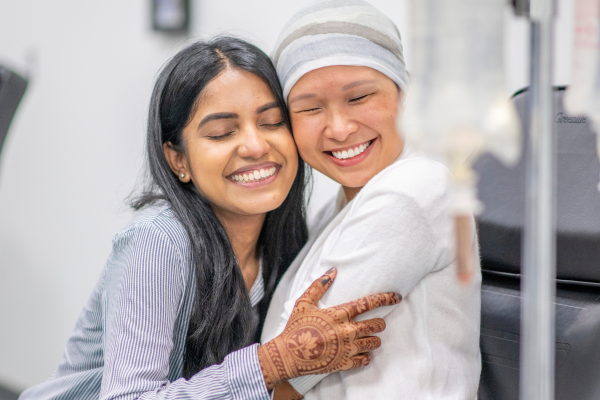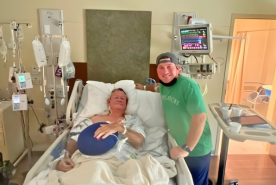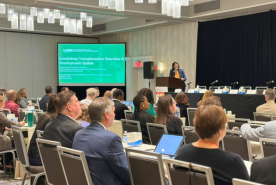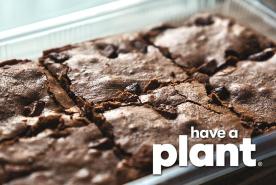January 16, 2025
Avoid the complications of dialysis with a preemptive kidney transplant. Find out when to start your transplant evaluation and explore your options.
Improving Long-Term Health with Preemptive Transplantation
Preemptive or early transplant with little or no time spent on dialysis can lead to better long-term health. Despite this, only around 2.5% of transplants in the U.S. are preemptive.
Bethany Cruz, an Outreach Coordinator at Houston Methodist, and Daniella Duke, a two-time preemptive transplant recipient, are here to share why preemptive transplants aren't as common and how raising awareness can improve access to this life-saving option.
What Is A Preemptive Transplant?
A preemptive transplant occurs before a patient begins dialysis.
"People can't legally get transplanted until their eGFR is under 20. But they can start the transplant evaluation before that," said Bethany. "Ask your kidney doctor about the right time to begin the evaluation for a preemptive transplant. My early transplant patients usually start at stage 4 kidney disease. "
Transplants with very little time on dialysis are considered "early."
"Patients with an early or preemptive transplant have higher survival rates,” Bethany said. “The kidney transplant success rate is also higher."
Benefits of a preemptive transplant:
- Less likely for a person’s body to reject their new kidney
- Avoid dialysis and dialysis-related complications
- Less restrictive diet
Subscribe today!
Join the NKF Blog Newsletter
Get inspirational stories and kidney disease resources delivered to your inbox every month. You'll gain practical insights and expert advice to help you better understand and manage your kidney health no matter where you are on your kidney journey.
Why Aren't Preemptive Transplants More Popular?
Despite the benefits, preemptive transplants are not often used in the United States.
"There isn't a lot of motivation to push patients to get a transplant before starting dialysis," said Bethany. "Other issues include lack of insurance, support, or the necessary care they need to stay healthy enough for a transplant. Some patients aren't referred early enough."
There are also a lot of myths about transplantation.
"In 2000, I learned my kidney function declined significantly. I'd been managing my kidney disease for years so I was shocked," Daniella said. "I was lucky that my doctor immediately recommended that I begin the transplant evaluation. It gave me time to find a living donor before dialysis."
During the transplant workup, Daniella heard others discuss their fears about transplant.
"People were nervous about infection and rejection," Daniella said. "I heard that the medications are hard to take and expensive. You won't be able to pay for everything and end up back on dialysis."
Kidney transplant surgery, like any surgery, comes with some risks.
"The risk is comparable to any major surgery–bleeding, blood clots, infection, pneumonia, and anesthesia side effects," Bethany said. "The Immunosuppressive Drug Bill passed so transplant patients won't lose access to medications after their Medicare coverage ends."
Most people recover well from their transplant, with a 98-99% survival rate.
"I had four-year-old twins to take care of. Dialysis would be too hard and make me a less ideal transplant candidate in the future," Daniella said. "I am fortunate that my eldest sister donated a kidney to me before I needed dialysis. I'm grateful to her and all living donors who give the gift of life."
The National Kidney Foundation (NKF) is here for you whether you're looking for a living kidney donor or want to become one. Discover a free online course that suits you and your kidney journey. Sign up for the Kidney Learning Center.
Getting a Preemptive Transplant
Daniella's kidney lasted for 21 years before failing.
"The rest of my family was ruled out as donors when I first needed a kidney. This time, I had to learn how to find a living donor," Daniella said. "I was afraid to share my story at first. But, it's easier to break down those walls when you are desperate."
Daniella threw herself into the search for a living donor.
"I used NKF's sample letters to write my story. I began to slowly share it. The response was so positive. It gave me confidence,” Daniella said. “Many didn't want to donate but did want to help. That's the message I want to share: People want to help you."
Part of the search included busting living kidney donation myths.
Daniella explained that:
- Donors can live a long, healthy life with one kidney.
- Kidney donors don't have to take medications as a result of their donation.
- There are few changes to diet or exercise after the donation.
Ten people began the living kidney donor evaluation for Daniella within four months. Learn more about making the decision to donate.
"Patients who share their story are up to seven times more likely to be transplanted than those only on the waiting list," Bethany said. "Looking outside your immediate circle is so important–you never know what potential altruistic donor is watching."
In 2020, Daniella received a surprise call–a deceased donor kidney was available for her. She decided to take it. As of 2024, her kidney is still going strong.
"I learned so much from the process of looking for a living donor–how to advocate and share my story," Daniella said. "Now I feel confident about continuing to spread the word about kidney disease, organ donation, and transplant."
Both Daniella and Bethany recommend that those nearing end-stage kidney disease ask for a transplant evaluation referral–even if they are unsure about the treatment. Many centers also allow patients to refer themselves without waiting for a provider.
"The time to act is now. Many people don't want a transplant, only to regret it when dialysis takes its toll. By then, it's often too late and they can't be listed," Bethany said. "You don't have to get a transplant after the evaluation. It's just good to explore your options early."



















